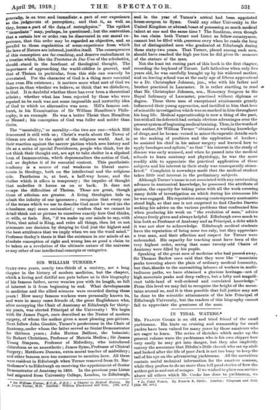SIB WILLIAM TURHER.A.
Six-Tv-Two years, nearly two-thirds of a century, are a long chapter in the history of modern medicine, but the chapter, which a loving and dutiful son puts before us in this biography of his famous father, never wearies you with its length; so full of interest is it from beginning to end. What developments in medicine and the allied sciences were recorded during these yearn ! How many famous workers were personally known to, and were in many oases friends of, the great Englishman who, after occupying the Chair of Anatomy at Edinburgh for thirty- Six years, was elected Principal of the University ! We begin with Sir James Paget, once described as the Nestor of modern sergery, of whom the author gives a most pleasing pen-picture. Next follow John Goodsir, Turner's predecessor in the Chair of Anatomy, under whom the latter served as SeniorDemonstrator for thirteen years ; John Hutton Balfour, the botanist; Sir Robert Christieon, Professor of Habana Medics; Sir James Young Simpson, Professor of Midwifery, who introduced chloroform as an anaesthetic ; James Syme, Professor of Clinical Surgery; Matthews Duncan, extra-mural teacher of midwifery; and other famous men too numerous to mention here. All these were resident in Edinburgh when Turner removed from St. Bar- tholomew's toEdinburgh on receiving the appointment of Senior Demonstrator of Anatomy in 1854. In the previous year Lister had migrated from University College, London, to Edinburgh, Cir WRefaa Tunwe, Lan., F.R.S.: a Chapter sn Meduat IlIeforp By A. loyal Turner, M.D. London: wallah Blackwood and Sons. Ms. nee.) and in the year of Turner's arrival had been appointed house-surgeon to Syme. Could . any other University in the United Kingdom or abroad, boast of possessing so much medical talent at one and the same time I The Soutbron, even though he can claim both .Turner and Lister as fellow-countrymen. cannot but be filled with generous envy when he ;made the long list of distinguished men who graduated at Edinburgh during there sixty-two years. That Turner, placed among such mem should have reached the high pox Lion he did gives tit, measure of the stature of the man.
Not the least Mt resting part of this book is the first chapter, recording the boyhood of Turner. Left fatherless when only five years old, he was carefully, brought up by his widowed mother, and on leaving school was at the early age of fifteen apprenticed to a Dr. Christopher Johnson, jun., who with his father and brother practised in Lancaster. It is rather startling to. read -de that Mr. Christopher Johnson, sen., Honorary Surgeon to the Royal Infirmary of Lancaster, practised without diploma or degree. These three men of exceptional attainments greatly influenced their young apprentice, and instilled in him that love of scientific investigation which was so marked intim throughout his long life. Medical apprenticeship is now a thing of the past, but withall its defeotsit had certain obvious advantages over the preeent system of beginning medical training. Thus, in the words of the author, Sir William. Turner "obtained a working knowledge of drugs, and he bece.mo vereed in minor thempeutio details such as the making of poultices and the application of leeches ; he assisted his chief in his minor surgery and learned hove to apply bandages and splints," so that " his interest in the study of disease was early aroused, and when he passed into the medical schools to learn anatomy and physiology, he was the more readily able to appreciate the practical application of these subjects and his interest in their study was consequently stimu- lated." Complaint is nowadays made that the medical student takes little real interest in the preliminary subjects.
Although Turner's name is not associated with any outstanding advance in anatomical knowledge, he possessed the attribute of genius, the capacity for taking pains with all the work covering many fields of investigation on which during his strenuous life he was engaged. His reputation among contemporary anatomists stood high, so that one is not surprised to find Charles Darwin seeking his advice on the various problems that confronted him when producing his work on "the evolution of man," advice always freely given and always helpful. Edinburgh owes muoh to hint both as Professor of Anatomy and as Principal, a debt which it was not slow to acknowledge. Edinburgh medical students have the reputation of being none too ruly, but they appreciate a true man, and their affection and respect for Turner were unbounded. His capacity for teaching must have been of the very highest order, seeing that some twenty-odd Chairs of Anatomy were filled by his pupils.
Speaking of the great men of medicine who had paseeclaway, Sir Thomas Barlow once said that they were like " mountain peaks towering above the plain of ordinary medical humanity, but that, thanks to the unremitting labours of workers in multi- tudinous paths, we have obtained a glorious heritago—not of high mountain peaks and deep valleys, but a lofty and magnifi- cent table-land of well-ordered and correlated knowledge," From this level we may fail to recognize the height of the moun- tales around US, and it is thus possible that full justice may not be done to the scientific attainments of the late Principal of Edinburgh University, but the readers of this biography cannot fail to appreciate the greatness of the man.






































 Previous page
Previous page